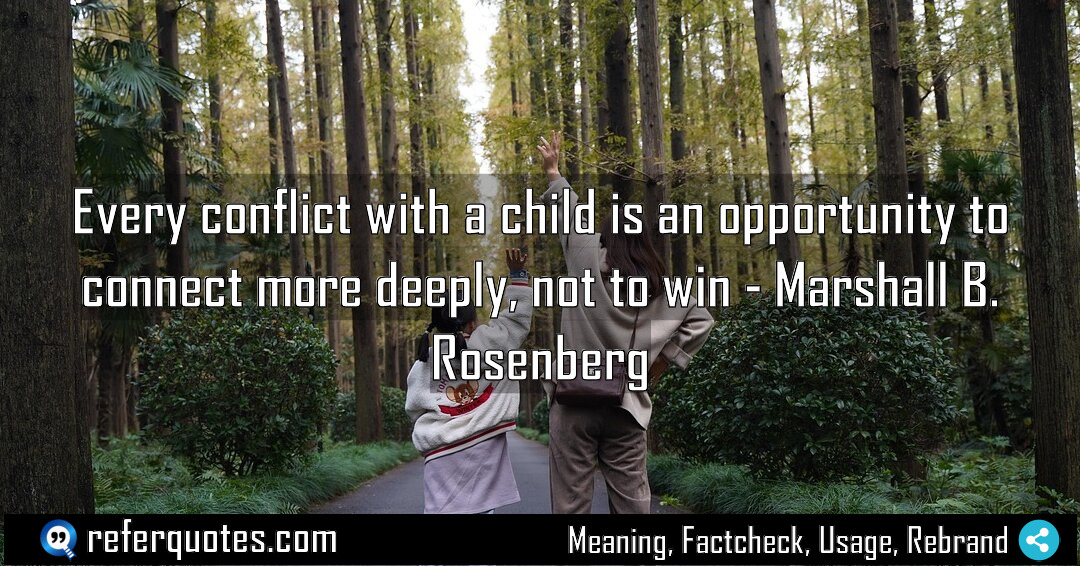
Every conflict with a child is an opportunity… to connect, not to win. It’s a game-changing mindset shift for parents that transforms power struggles into moments of genuine relationship-building.
Share Image Quote:
Table of Contents
Meaning
At its heart, this quote is about reframing. It tells us to stop seeing a child’s resistance as a battle to be won and start seeing it as a bridge to a stronger, more trusting relationship.
Explanation
Let me tell you, this was a total lightbulb moment for me. We’re so hardwired, especially when we’re stressed, to see a kid pushing back as a challenge to our authority. Our ego kicks in and we think, “I’m the parent, I have to win this.” But Rosenberg is saying that’s the exact moment to drop the agenda. It’s not about you being right. It’s about understanding what’s happening for them beneath the surface behavior. When you stop trying to win, you create space for connection. And that connection, that’s the real win. It’s what builds long-term cooperation and respect, way more than any forced “because I said so” ever could.
Quote Summary
Reading Level70
Aesthetic Score88
Origin & Factcheck
This wisdom comes straight from Marshall B. Rosenberg’s 1999 book, Raising Children Compassionately: Parenting the Nonviolent Communication Way. It’s a core tenet of his Nonviolent Communication (NVC) framework. You might sometimes see the sentiment floating around unattributed, but the specific phrasing is Rosenberg’s.
Attribution Summary
Where is this quotation located?
| Quotation | Every conflict with a child is an opportunity to connect more deeply, not to win |
| Book Details | Publication Year/Date: 2004; ISBN/Unique Identifier: 9781892005140; Last edition: PuddleDancer Press, 1st Edition, 48 pages. |
| Where is it? | Chapter: Transforming Conflict, Approximate page from 2005 edition |
Context
In the book, this isn’t just a nice idea tossed out there. It’s the practical application of NVC in the parenting arena. Rosenberg places this concept right in the middle of daily struggles—bedtimes, homework, tantrums—arguing that these are the very moments we have the richest opportunities to teach empathy and mutual respect by how we respond.
Usage Examples
So how does this look in the wild? Let’s say your kid is refusing to put on their shoes to leave the house.
- The Old Way (Trying to Win): “Put your shoes on NOW or we’re not going to the park!” This creates a power struggle.
- The Rosenberg Way (Connecting): Kneeling down. “You’re really having fun with that truck, huh? It’s hard to stop. I get it. We do need to go soon. How about you drive the truck all the way to the door, and then we’ll get our shoes on together?” You’ve acknowledged their world, connected with their feeling, and found a collaborative path forward.
This approach is gold for parents, teachers, coaches—anyone in a guiding role with young people.
To whom it appeals?
Share This Quote Image & Motivate
Motivation Score84
Popularity Score78
Shareability Score82
FAQ
Question: But if I don’t “win,” doesn’t that mean I’m letting my child walk all over me?
Answer: That’s the biggest fear, right? But connection isn’t permissiveness. You’re still the parent. You’re just leading with empathy first, then collaboration on the solution, instead of starting with a raw power play. The boundary still gets held, but the relationship stays intact.
Question: Is this only for little kids?
Answer: Absolutely not. The principle scales. With a teenager, a conflict over curfew is a prime opportunity to connect about their desire for freedom and your need for their safety, rather than just slamming down a rule.
Question: What if I’m just too angry in the moment to connect?
Answer: That’s so real. The goal isn’t perfection. Sometimes the most compassionate thing you can do is say, “I’m feeling too upset to talk well right now. I’m going to take five minutes to calm down, and then we’ll figure this out.” That models self-regulation and still honors the connection.
Similar Quotes
You know, “Conflict handled with respect creates stronger relationships” is one of those truths that seems counterintuitive until you live it. I’ve seen teams completely transform when they stop running…
When our intention is to understand, rather than to win, we completely shift the dynamic of any conversation. It’s the difference between a battle and a collaboration, and honestly, it’s…
Peaceful parenting begins when we stop trying to control. It’s a total mindset shift from managing behavior to building a real, human connection with your child. This is the core…
You know, I’ve been thinking a lot about that Dale Carnegie idea: “The goal is not to win every argument…” It’s a game-changer. It flips the entire script on why…
You know, the goal is not to avoid conflict… it’s a game-changer. It reframes conflict not as a battle to win, but as a conversation to be understood. This shifts…
